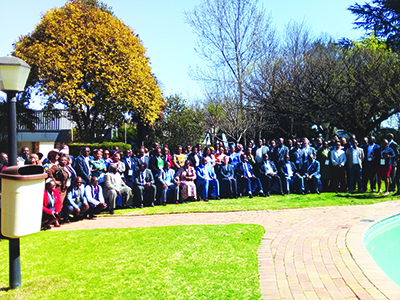
By Liapeng Raliengoane
MASERU – In a bid to provide a platform for the region to ensure that the implementation of the discussion is aligned to the regional imperatives and works towards delivering tangible benefits on the ground, Southern Africa Development Community (SADC) is currently holding the 10th SADC Multi-Stakeholder Dialogue which started yesterday (Monday) and is expected to end tomorrow (Wednesday).
This dialogue is held in Maseru under the theme “Bolstering regional productive capacities for water, energy, food security and ecosystem resilience to achieve inclusive and sustainable industrial transformation.” This theme aims to accelerate implementation of the Vision 2050 aspirations and the RISDP (2020–2030), in particular, the Industrialization and Market Integration, and the Infrastructure in Support of Regional Integration pillars.
The outcomes of this three- day Dialogue will feed into the decisions to be presented by the Ministers responsible for food, water, and energy security to the SADC Council of Ministers.
Speaking at the event, SADC Secretariat, Director of Infrastructure ‘Mapolao Mokoena opined that strengthening productive capacities will produce balanced sustainable development and boost the ability of SADC Member States to respond to challenges, including climate change impacts and Covid-19.
European Union (EU) Head of Delegation Her Excellency Paula Amadei expressed the importance of events like this, which touch on issues of natural resources. “Natural resources are increasingly at risk due to factors such as climate change. Agriculture is the main source of livelihoods for 60% of the population in Sub-Saharan Africa. There is a broad consensus to adopt sustainable methods of preserving the environment that so many rely on to ensure food security. Since February this year, an additional factor is affecting food security in the region, the unjustified Russia Ukraine invasion.”
Ministry of Water Principal Secretary (PS) Lisema Lekhooana indicated that the three day dialogue is critical in getting the region water secure, food secure and energy secure.
“The southern Africa region just like other regions in Africa is in the process of recovering from the effects of Covid-19 pandemic. In recent times, our region has also felt the impact of the war in Ukraine. We have already witnessed how the disruption of the supply of the food commodities has driven up prices of commodities and exacerbated food insecurity in the region. This presents us opportunity to, line with this dialogue’s theme, review our food production capabilities and draw up practical strategies on how the region can become self-reliant and even improve its export capacities around the food commodities and more,” Lekhooana added.
He also signposted that water is critical to poverty alleviation and that World Health Organization (WHO) warns that in three years’ time, 2025, half of the world’s population will be living in water-stressed areas and SADC region is not spared.
“In Lesotho, an estimated 15% of the population in rural areas is said to be classified as facing acute food insecurity and from October 2022 to March 2023, an estimated 22% of the population in rural areas is projected to face acute food insecurity due to emerging factors such as climate change,” he further revealed.
The SADC Multi-Stakeholder Dialogue is a biennial event organised by the SADC Secretariat traditionally held as events driven by the Water Sector. It provides a forum for practitioners and other influencing sectors to have a dialogue on pertinent issues that need to be addressed to deepen regional integration and address poverty in the region.
This year’s Dialogue is funded by the EU supported SADC WEF Nexus Dialogue Project and the “Support to Integrated Catchment Management (ICM)” Project in Lesotho, co-financed by the EU and the German Federal Ministry for Economic Cooperation and Development (BMZ) and implemented by the Deutsche Gesellschaft für Internationale Zusammenarbeit (GIZ).


